Maarintie 8
Maarintie 8
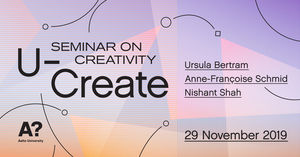
The 2019 U-Create Seminar will be dedicated to examining the increasingly impactful role creativity plays in society at large, science, business and multiple areas of research. What are the demands on creative thinking and ways of working today? How can we understand creativity in light of the exceeding influence of artificial intelligences and automation on our patterns of innovation?
Moreover, there is a growing acknowledgement of the incapacity of any one discipline to address and make sense of the complex problems we face single-handedly. Hence, working across multiple disciplines requires a process of ‘opening up’ to creativity that the seminar will address from different angles through presentations by three distinguished guest speakers: Ursula Bertram (Professor UT Dortmund, Artist), Anne-Françoise Schmid (Philosopher) & Nishant Shah (Theorist, Vice President Research ArtEZ University, NL). The seminar will also have commentary speakers from Aalto University.
The objective of the U-Create Seminar on Creativity is to set the agenda for an ongoing and evolving discussion on the exigency, significance and future of creativity across society, industry and academia.
10.00 – 10.10: Introductory Comments by Bassam El Baroni and Juuso Tervo
10.10 – 10.55: Keynote 1: Anne-Francoise Schmid: Invention, fiction, creation
11:05 – 11:50: Keynote 2: Nishant Shah: The unbearable cleanliness of creativity: Of pornographers, pirates, and pagans
12:00 – 13:00: Lunch Break
13:05 – 13:50: Keynote 3: Ursula Bertram: Is Christmas already over? About artistic thinking
13:50 – 15:00: Open Panel Discussion with Contributions by Aalto University Conversants: Jouko Lampinen, Emmi Pouta, Sebastian J. Schlecht, Henri Weijo, Matthew C. Wilson (Moderated by Bassam El Baroni and Juuso Tervo)
15:00: Closing Remarks
The U-Create Seminar is free and open to members of the general public as well as the Aalto community. Students are encouraged to attend. Refreshments and snacks will be available.
Please Register for the Event here.
Disruptive, non-linear, unruly thought and action have always led to great works of art, path-breaking inventions and forward-looking perspectives. But how can this precious good find its way into our everyday working life to help us deal with social, ecological and economic challenges?
The crucial step, Ursula Bertram contends, is to reach a synergy of logically justifiable knowledge and the capacity to navigate in open systems. To find out how such synergy could come about, Ursula Bertram has observed the strategies and principles of artists, choreographers, musicians and unruly thinkers and compared them with the statements of physicists, mathematicians, managers and researchers. She shows that when artistic thought is circulated and probed in non-artistic fields, an extremely efficient pattern called artistic transfer emerges.
Starting from invention - often mono-disciplinary - in philosophy, we will broaden the subject by adding fiction. This is distinguished from invention by the assumption of a point of externality and a new opening of space. It prepares for variations of various disciplines and engages in a more generic process.
Creation, a quasi-divine affair, touches more closely the forms of reality. Creation leads to an interpretation of language as a forcing and modifies the functions of metaphor, confronting them with the impossible. Creation is indifferent to disciplines while making use of them. We will propose based on this a sequence: that there is an X, it is possible to make the X, the real = X of a public work, the construction of a common = X between philosophies, arts and sciences.
Conversations around creativity often lead to gentrification and glorification of the creative actor. Creativity is often presented both as a scarce resource and as a privileged site of intervention making. Even when the focus is on ‘everyday creativity’ or ‘generalized creativity’ that interpellates everybody into the creativity discourse, there is a wilful erasure of bodies and subjectivities that are often not recognized or in fact penalized for being creative.
The unclean, the forbidden, the disruptive, and the dangerous are often sacrificed at the altar of creativity matrices. In this talk, concentrating on the technologized approaches to creativity, Shah will explore the limitations of the creativity discourse and propose that we need to make creativity dirty in order to account for its different futures.
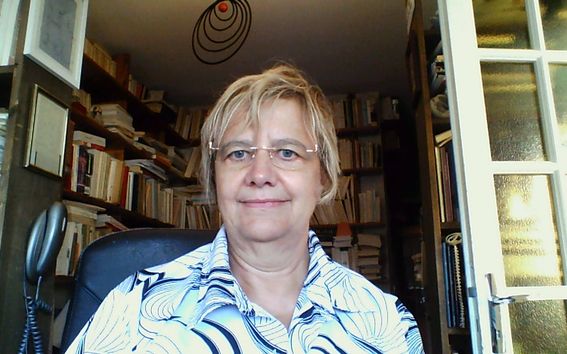
Anne-Françoise Schmid is a philosopher among the scientists (EPFL, INSA, INRA, MinesParisTech) and recently philosopher among artists (film vimeo Letre, philosophical scripts, collaborations with Robin Mackay, Benoît Maire, Alice Lucy Rekab, Gallien Déjean, Ivan Ebel). Schmid is a Poincaré specialist and editor of Russell and Couturat, she taught philosophy and epistemology at the University of Paris Ouest Nanterre, mathematical logic at the University of Geneva, epistemology and ethics at INSA de Lyon.
Her work addresses the problem of how to avoid exclusions: exclusions of scientific methods emerging in science in light of what she sees in laboratories and research centers/exclusion of philosophies in the name of the supremacy of one of them. To this end, she has worked to decipher the hypotheses of classical epistemology [See: ‘The Age of Epistemology, Science, Engineering, Ethics’, ed. Kimé, Paris, 1998] and has made theoretical extensions that can take into account the generalized interdisciplinarity of the contemporary sciences. She works in parallel with a philosophical style not in, but with philosophies in their multiplicity. She has written several fictions about lost films and philo-fictions to explain some characteristics of philosophical invention.
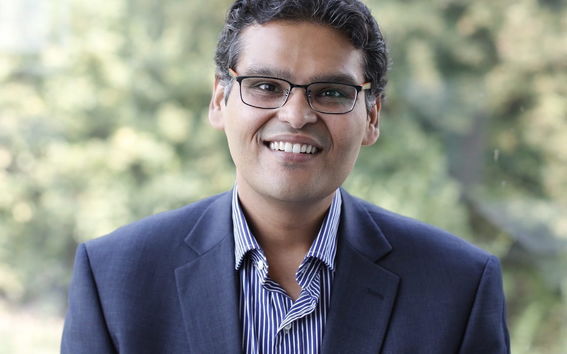
Dr. Nishant Shah is a feminist, humanist, technologist and is currently the vice-president of Research at the ArtEZ University of the Arts, The Netherlands. He works as a knowledge Partner with The Digital Earth fellowship with Hivos, and with the Feminist Internet Research Network with the Association of Progressive Communication.
His ongoing work is invested in understanding the state of misinformation, fakeness, and violence through the frame of techno-aesthetics ‘aesthetechs’ in order to find new processes of civic action.
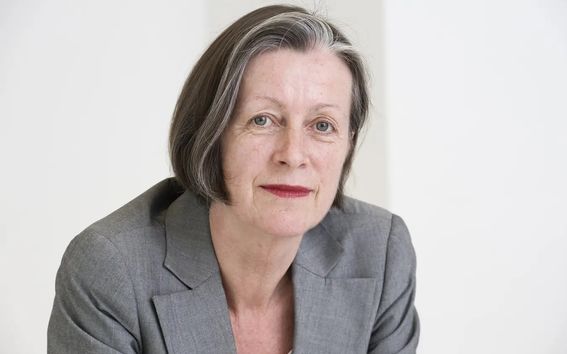
Ursula Bertram is an artist and em. professor at the Technical University Dortmund, Germany. Guest professor in the USA and Venezuela. Her research focuses on the transfer of artistic thinking into other fields, such as business and science. She is the founder of the flagship project Centre for Artistic Transfer 2007, with the [ID] factory providing an interdisciplinary space for teaching and the development of non-linear, artistic thinking.
Her artistic works have been exhibited in Germany, the United States, Russia, and Venezuela. In 2012, The Centre for Artistic Transfer/[ID]factory was awarded a prize by the NRW Ministry of Innovation, Science and Research. Her latest publications are ARTISTIC TRANSFER, Efficiency Through Unruly Thinking, Transcript, 2018; PROMOTION, research as misunderstanding 2017; and Kunst fördert Wirtschaft, Transcript 2012.
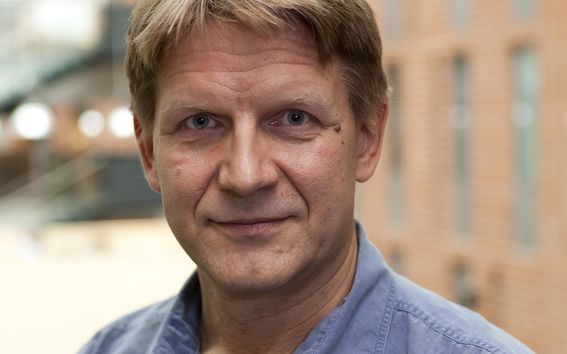
Jouko Lampinen is professor in Computational Science and Dean of the School of Science, Aalto University.
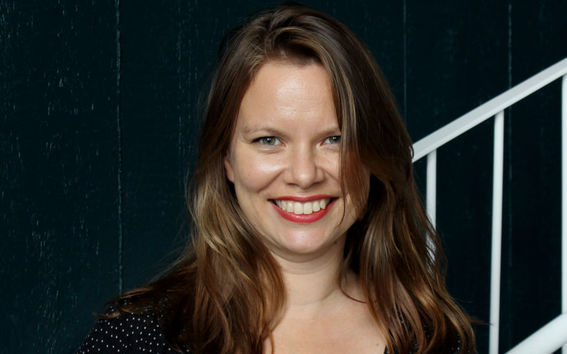
Emmi Pouta is a textile designer working in the intersections of textile and technology, and driven by a desire to push the boundaries of textile capabilities. She is currently working on her PhD between the Aalto University School of Art, Design and Architecture and the School of Electrical Engineering, with the aim of understanding how the skills of a textile designer may be situated within the HCI process. She has specialised in woven textiles, with an eTextile-focus on multilayer sensor structures and the integration of electronics into textile materials, from design-orientation.
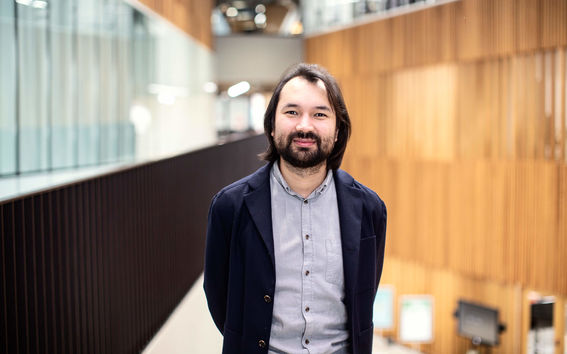
Sebastian J. Schlecht is a Professor of Practice for Sound in Virtual Reality at Aalto University, Espoo, Finland. He received the Diploma in Applied Mathematics from the University of Trier, Germany, in 2010 and the M.Sc. degree in Digital Music Processing from School of Electronic Engineering and Computer Science at Queen Mary University of London, UK, in 2011. In 2017, he received a doctoral degree at the International Audio Laboratories Erlangen, Germany, on artificial spatial reverberation and reverberation enhancement systems. From 2012 on Dr. Schlecht was also an external researcher and the lead developer of the 3D Reverb algorithm at the Fraunhofer IIS, Erlangen, Germany. He received best paper awards at IEEE Workshop on Applications of Signal Processing to Audio and Acoustics (WASPAA 2019), International Conference on Digital Audio Effects (DAFx 2018), AES International Conference on Audio for Virtual and Augmented Reality (ARVR 2018). His research interests are acoustic modelling and auditory perception of acoustics, analysis, and synthesis of feedback systems, music information retrieval, and virtual and augmented reality. He is also an active live and studio musician in contemporary and popular music.
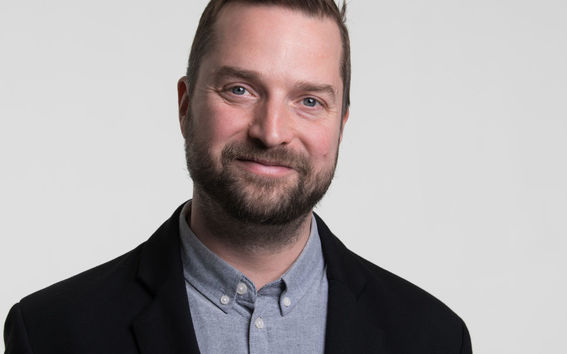
Henri Weijo is Assistant Professor in Marketing at Aalto University School of Business. His research focuses on consumer creativity in its various forms. He also teaches creativity in marketing and is both the director of the Marketing Master’s program and the head of the Fashion Management minor on the business school side.
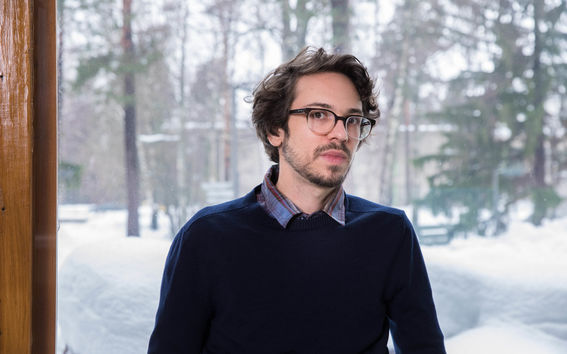
Matthew C. Wilson is an American artist based between the Netherlands and Finland, he is currently Aalto University’s Artist-in-Residence. In his videos, sculptures, and installations viewers meet a range of agents—mercurial materials, sites, non-humans, personae, and inter-subjective entities—that are entangled with natural processes and shape-shifting historical forces. Wilson holds an MFA in Visual Arts from Columbia University. He has been a participant in the Whitney Independent Study Program and numerous residencies including the Jan van Eyck Academie and Skowhegan. Recently, Wilson launched the Spectral.Exchange platform as an outcome of an Artistic Research Residency at Tabakalera, San Sebastián, ES, and premiered his short film Within the Temple Without at IFFR - International Film Festival Rotterdam.
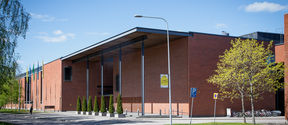
Maarintie 8

Here you will also find restaurants, the map, the Aalto Space mobile app, access control - all practical information on one page! You can also visit the campus virtually.
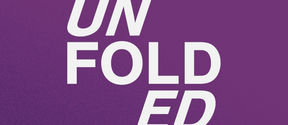
Aalto University UNFOLDED magazine focuses on contemporary issues dealing with creativity, experimentation, and transdisciplinary co-creation.